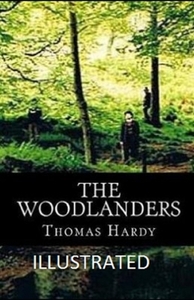You need to sign in or sign up before continuing.
Take a photo of a barcode or cover
reflective
relaxing
sad
slow-paced
Plot or Character Driven:
A mix
Strong character development:
Complicated
Loveable characters:
Complicated
Diverse cast of characters:
No
Flaws of characters a main focus:
Complicated
"That was how it had begun, and tragedy had been its end."
"The plantations were always weird at this hour of eve -- more spectral far than in the leafless season, when there were fewer masses and more minute lineality. The smooth surfaces of glossy plants came out like weak, lidless eyes: there were strange faces and figures from expiring lights that had somehow wandered into the canopied obscurity; while now and then low peeps of the sky between the trunks were like sheeted shapes, and on the tips of boughs sat faint cloven tongues."
"Grace was thus unexpectedly worsted in her encounter with her old friend. She had opened the window with a faint sense of triumph, but he had turned it into sadness; she did not quite comprehend the reason why. In truth it was because she was not cruel enough in her cruelty. If you have to use the knife, use it, say the great surgeons."
"The plantations were always weird at this hour of eve -- more spectral far than in the leafless season, when there were fewer masses and more minute lineality. The smooth surfaces of glossy plants came out like weak, lidless eyes: there were strange faces and figures from expiring lights that had somehow wandered into the canopied obscurity; while now and then low peeps of the sky between the trunks were like sheeted shapes, and on the tips of boughs sat faint cloven tongues."
"Grace was thus unexpectedly worsted in her encounter with her old friend. She had opened the window with a faint sense of triumph, but he had turned it into sadness; she did not quite comprehend the reason why. In truth it was because she was not cruel enough in her cruelty. If you have to use the knife, use it, say the great surgeons."
emotional
inspiring
lighthearted
reflective
sad
slow-paced
Plot or Character Driven:
Character
Strong character development:
Yes
Loveable characters:
Yes
Diverse cast of characters:
No
Flaws of characters a main focus:
Yes
emotional
funny
medium-paced
Plot or Character Driven:
A mix
Strong character development:
Yes
Loveable characters:
Yes
Diverse cast of characters:
No
Flaws of characters a main focus:
Yes
This was one of my three favorite Hardy novels. It's a gentle and sad love story. Enjoy the beautiful and reverent descriptions of the woodlands and the country people in the towns. It's such a slice of the life Hardy observed.
2.5 stars. This deals with really interesting topics and has fascinating characters, but most of the action only starts after 200 pages ... such a shame.
emotional
reflective
sad
He tardado tanto en leer este libro que casi me da vergüenza darlo por terminado cuando he estado a punto de dejarlo on hold más de una vez. Y no precisamente porque no me estuviera gustando, sino porque es uno de esos libros que hay que leer con mucho tiempo libre en las manos y no es mi caso. La moraleja para la próxima vez es que a Thomas Hardy hay que leerle en vacaciones y de relax porque si no, la cosa no funciona.
El libro me ha gustado mucho y también me ha hecho enfadar mucho. Me explico: cuando una lee clásicos centrados en el amor y el matrimonio, hay que tener en cuenta la mentalidad de la época y asumir los estrictos roles de género que se representan con la esperanza de que el autor o autora los critique de una forma superficial y permitida por la época en que su obra es publicada. Thomas Hardy presenta al padre de Grace, el señor Melbury, como un señor que considera a su hija poco más que un caballo que hay que vender al mejor postor y a esta como una mujer tímida, conservadora y sumisa que acepta todo lo que dice su padre sin rechistar aunque en su fuero interno se plantee una pequeñísima rebeldía a la que nunca da rienda suelta por no traicionar el honor de su familia y el de ella misma. El señor Melbury cambia de opinión como de camisa según lo que le conviene y la opinión de Grace se la trae al pairo, ahora Giles me convence, ahora no, ahora te casarás con el doctor Fitzpiers porque te lo digo yo, y ay qué trauma que ahora no podemos volver atrás, tu honor (MI honor) quedará mancillado de por vida. Grace se rebela solo por dentro, y son las palabras de Hardy y los hechos que cuenta lo que dan a entender que nada de esto tendría que ser así, pero no puede ponerlo abiertamente en la boca de su protagonista femenina. Ni él mismo era tan progresista, pero ese tímido intento de cambio me ha gustado mucho. Es un plus que le doy a este libro y una oportunidad de volver a leer sobre sus impresiones de la estricta sociedad inglesa de estos tiempos en un futuro. No sé si cercano o no, eso sí, todo dependerá de cómo me administre el tiempo libre.
El libro me ha gustado mucho y también me ha hecho enfadar mucho. Me explico: cuando una lee clásicos centrados en el amor y el matrimonio, hay que tener en cuenta la mentalidad de la época y asumir los estrictos roles de género que se representan con la esperanza de que el autor o autora los critique de una forma superficial y permitida por la época en que su obra es publicada. Thomas Hardy presenta al padre de Grace, el señor Melbury, como un señor que considera a su hija poco más que un caballo que hay que vender al mejor postor y a esta como una mujer tímida, conservadora y sumisa que acepta todo lo que dice su padre sin rechistar aunque en su fuero interno se plantee una pequeñísima rebeldía a la que nunca da rienda suelta por no traicionar el honor de su familia y el de ella misma. El señor Melbury cambia de opinión como de camisa según lo que le conviene y la opinión de Grace se la trae al pairo, ahora Giles me convence, ahora no, ahora te casarás con el doctor Fitzpiers porque te lo digo yo, y ay qué trauma que ahora no podemos volver atrás, tu honor (MI honor) quedará mancillado de por vida. Grace se rebela solo por dentro, y son las palabras de Hardy y los hechos que cuenta lo que dan a entender que nada de esto tendría que ser así, pero no puede ponerlo abiertamente en la boca de su protagonista femenina. Ni él mismo era tan progresista, pero ese tímido intento de cambio me ha gustado mucho. Es un plus que le doy a este libro y una oportunidad de volver a leer sobre sus impresiones de la estricta sociedad inglesa de estos tiempos en un futuro. No sé si cercano o no, eso sí, todo dependerá de cómo me administre el tiempo libre.
Thomas Hardy has become one of those reliable authors that I know I’ll always appreciate. His novels really reward perseverance— this took me forever to get into, partially because I was traveling for 2 weeks and didn’t really have time to read, but also just because it’s definitely not a page-turner. But if you sit with it and really take in all of the intricate descriptions of the landscapes and woods and everything, you can really feel the setting and atmosphere. His writing is so evocative. I also came to care surprisingly deeply about all of the characters. It seems that everyone gets a tragic ending of some sort in a Hardy novel, but there are degrees to it, and this had good variety of some characters getting more tragedy than others. Overall, worth the labor to get into this and I’ll definitely continue reading his other novels. I’d rank this third behind “Tess” and “Far From the Madding Crowd.”






